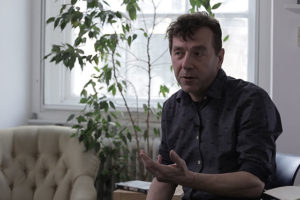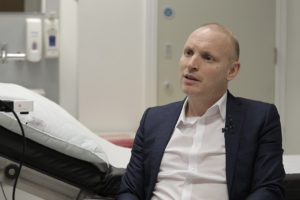Standard Model
Physicist Jonathan Butterworth on history of the Standard Model, its core principles and the role of the Higgs...
The video is a part of the project British Scientists produced in collaboration between Serious Science and the British Council.
We use two forms of cognition. One of them is called cold cognition. And that’s usually what we think about: attention, memory, everyday types of things. It’s really non-emotional cognition. So an example of it would be, you know, when you are planning your day, work, how you organize your day, so it’s the most efficient day for you. So you think like “Ok, I have to go through this, this and this. Now, what is the most important thing to do?” And that is cold cognition. And it is also called decision-making, because you have to make decisions about how you are going to structure your day. And that’s what we are usually used to. But there is another form of cognition called hot cognition. And that’s emotional or social cognition. It is also the type of cognition that involves a conflict between risk and reward.
So you have to make decisions that are risky, where you stand a lot to gain, but also you might lose a lot. And frequently when I’m talking to my students about hot cognition, I say “Suppose you are a student at the university and all your friends have just finished their exams, and they are about to go to a pub to celebrate. And one of them says to you: “Look, I know you’ve got one exam left to do tomorrow morning. But why don’t you come out with us anyway and celebrate? You are nearly done. And by the way, that lady you’d like to meet is coming out with us. So come and join us at the pub.” And then you have to make a decision quite quickly. Are you going to join your friends or are you going to do the right thing and stay to study for your exam and to get a good sleep so you’ve consolidated your memories and you feel fresh when you go to the exam? So you’ve got a lot to gain because it would be a great fun to go out with your friends and you might also meet this person you’ve been interested in. But there is also a lot to lose, because it is actually your future: if you don’t get a good exam mark it could affect your outcome in the future too.
The interesting thing is when we put people in the scanner and we might ask them to do a cold decision-making task (perhaps they have to decide on whether or not, how many moves it might take to do a particular problem) we find that it activates the circuit in the brain which includes an area in the brain called dorsolateral prefrontal cortex. Now, in contrast, if we ask them to do the CANTAB Cambridge Gambling Task, which is a risky decision-making task, what we find is that it activates different neural circuitry in the brain and this involves an area called orbitofrontal cortex, which is kind of behind the eyes. So these two types of decision actually activate different neurocircuitry in the brain. Now, what we found is that in patient groups you can actually find that there is a dissociation between them so that if you have a brain injury in dorsolateral prefrontal cortex, you can find that he is fine with the hot decision-making, but he can’t do the cold decision-making whereas if you take people with frontal dementia, which affects the orbital frontal cortex, you can see that they are very poor at making these risky decisions. And we know that this manifests itself in their daily living, because they do risky things and have personality changes.
And you can see that they are affected in their risky decision-making, but their cold decision-making is still intact. I’ve also looked at this in a different type of area, because I’ve been interested in what makes for a good entrepreneurial brain. How do entrepreneurs think differently from the rest of us? So, in the study which I published in Nature we looked at entrepreneurs and compared them with high-level managers, because we thought that was a good comparison group. So the entrepreneurs had to have started up at least two companies and they were what we call the Cambridge Silicon Fen. We have a high technology cluster here, so we were able to get entrepreneurs. They had to have started up two companies and they had to have been regarded by their peers as entrepreneurs. And then we took another group which is high-level managers, who had never started any companies up before but with the same age and ability as these entrepreneurs (IQ, age). We compared them on a number of tasks and what we found was that on the cold decision-making tasks entrepreneurs and managers were just as good as each other, but on the hot decision-making tasks we found that differences come out.
And so, the interesting thing was these (entrepreneurs and managers) were about 50 years of age on average. But we found that the entrepreneurs were showing risky and sort of “betting” behavior on these hot decision-making tasks at the level of 21 to 27 year olds. So they were very risky. But this was combined with their ability to solve problems flexibly. How good were they when they got stuck in a problem of quickly changing to a new solution so that they could solve the problem? They were very fast at this. So this risky decision-making was combined with good cold cognitive planning, but also with an ability to problem-solve really rapidly. When we looked at the managers we found that when they couldn’t solve a problem on the first occasion, they couldn’t switch like the entrepreneurs could. They weren’t that cognitively flexible that they could switch. They got a bit stacked, they kept trying to do the same solution again and again.
This is the way we can find out these interesting differences between how people are superior at hot and cold cognition. And this very important, for instance, for people, who are venture capitalist, because you can just imagine that when you are venture capitalist and you are trying to decide where should I put my money, I could risk all these money and gain a lot, but I could also lose these money, you have to evaluate business plans. And that’s cold decision-making. You have to say what are they making, where are they going to make it, have they done the most optimal costing for all these pieces to make the parts and so on. That’s all called business plan you are evaluating. But when you meet people and you actually ask some questions and you probe, when a venture capitalist comes into a situation where he has to evaluate who he or she is going to give the money to, they have to decide does this person really know what they are doing. And that’s more of a hot decision-making process. And there you have to ask questions and then you determine whether somebody really knows what they are talking about. It’s almost like a gut sensation.
We need to know more about how hot and cold cognition interact with each other and why we might bias ourselves toward one rather than another, because we often have to make these decisions. For instance, in your everyday live you might be offered a job promotion and you get more money and status, it seems really good. But maybe you have to move somewhere, so you have to leave your friends and family, and that’s of course got an emotional and social context to it. So then we have to figure out how do we bias those different decisions? And how can we make the most optimal decisions? We want to make sure that our decisions are the best that they can be. And that requires both a nice combination of hot and cold. And we can see in neuropsychiatric orders and brain injury when this goes badly wrong how poor these decisions can be. So, for instance, somebody with mania when they have problems with hot decision-making, risky decisions, they may max their credit cards, so they are going to spend everything and they may put themselves in circumstances where it’s very dangerous, because they start talking to people randomly, who they don’t really know what they are like, and maybe go out with them, though they don’t have any background for knowing who these people really are.
You can make unfortunate and dangerous risky decisions or ones that affect your economy and so forth, if you don’t have it well in balance. So we need to know more about how to keep that in balance. Then we need to know what mechanisms, what drugs will help us treat these sort of disorders and neuropsychiatric disorders, brain injury where these things get out of balance. And we have some good evidence for the cold cognition, but we have less evidence for hot cognition although we recently had done a study with patients with Schizophrenia, where we asked them to recognize facial expressions, so that they had to say is that a happy face or is that a sad and that type of thing. And what we did find is that when we added on Modafinil to their antipsychotic medication, we did get improvements in their ability to recognize these emotional faces. It did seem that there may be ways that we can improve these hot cognition processes through drugs as well.
And obviously entrepreneurs are quite different in the sense that they, first of all, have a good cold decision-making. So, they’ve evaluated it very carefully when they’re going to make a decision about business or going to some area. So their cold decision-making is very good. And that’s only that they have the ability to make what we call a functional impulsivity. So they may have decided: “Oh, I think this is a good area to go into!”, but it is actually based on the fact that they know they have a time-limited option and they actually have evaluated the background to this. So they’re making quite good quality decisions along with obviously having some risk-tolerance, they are able to tolerate the risk of doing that. And that’s really the difference between gamblers, because the gamblers are probably not making the good-quality decisions and possibly the cold planning. They haven’t looked at what they’re doing and haven’t calculated very carefully the risks of what they’re doing either.

Physicist Jonathan Butterworth on history of the Standard Model, its core principles and the role of the Higgs...

Oncologist Justin Stebbing on targeted therapies, side effects of chemotherapy and how multidisciplinary appro...

Nanotechnologist Andrea Ferrari on inelastic light scattering, Hall bars, and Cambridge Nanosystems